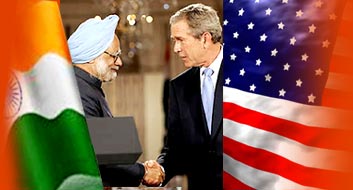US agrees to changes in nuclear trade waiver for India
 Vienna - The United States has pledged to change its proposal seeking to exempt India from international export control rules in a bid to reach a consensus on lifting a nuclear trade embargo against the Asian nation, sources close to the Nuclear Suppliers Group (NSG) said Thursday.
Vienna - The United States has pledged to change its proposal seeking to exempt India from international export control rules in a bid to reach a consensus on lifting a nuclear trade embargo against the Asian nation, sources close to the Nuclear Suppliers Group (NSG) said Thursday.
Sources close to the NSG, which sets international nuclear export control standards, said several members were still critical of US drafts for a trade exemption but expected a decision on Friday.
"I think there can be a consensus tomorrow," one diplomat said at the end of the first day of a two-day meeting chaired by Germany in Vienna.
The US was aiming "at reaching an early consensus," US Undersecretary for Political Affairs William Burns told reporters earlier on Thursday.
"I believe that we are making steady progress in this process, and we will continue to make progress," he said.
Austria, Ireland, the Netherlands, New Zealand, Norway and Switzerland are among the most vocal of those among the 45-member NSG calling for amendments, as they seek to balance an exemption for India with strengthening the global non-proliferation regime.
They and other nuclear exporters are pushing for a provision in the trade exemption that spells out consequences in case India tests a nuclear bomb.
One source close to the negotiations said the flexibility shown by the US was "a great success."
"It seems the Americans understand that we still have work ahead of us," he said.
Lobbying for the export exemption is part of Washington's 2005 nuclear deal with New Delhi, which is seen as a cornerstone in improving relations between the two countries.
The administration of President George W Bush is pushing for an NSG decision this week, so that the US Congress can ratify the bilateral agreement before it goes into recess ahead of the presidential election.
While some participants at the meeting were confident they could reach a consensus on Friday, others said it depended on whether Washington and New Delhi were prepared to take steps to accommodate countries seeking amendments.
Indian officials have said that mentioning nuclear testing in the NSG exemption was a red line that should not be crossed.
New Delhi is demanding an unconditional exemption from current nuclear trade rules, which rule out exports to countries like India that have not signed the Nuclear Non-Proliferation Treaty.
The US was putting "great pressure" on the six most critical countries to agree quickly to a trade exemption, a source said.
As of Thursday morning, the US draft incorporated only two of the more than 50 amendments proposed by 20 NSG members at a first meeting on India in August.
A clause on transparency about trade with India, and a provision for NSG consultations if "circumstances have arisen which require consultations," were added to the original draft, according to a copy of the text published Wednesday by the Arms Control Association in Washington.
Meanwhile a fresh political row has broken out in India over the nuclear deal, with the main opposition Bharatiya Janata Party and left-wing parties demanding the resignation of Premier Manmohan Singh for misleading parliament on the agreement with the US.
The BJP made the demand after Wednesday's disclosure of correspondence between the Bush administration and Congress, which said the US had no intention of selling sensitive nuclear technology to India, and nuclear commerce would be immediately halted if Delhi tested a nuclear weapon.
In a reaction to the outcry from the political parties, the Indian Foreign Office said New Delhi would be guided "solely" by the terms of the bilateral nuclear agreement, the India-specific inspection agreement with the International Atomic Energy Agency (IAEA) and the waiver from the NSG. (dpa)